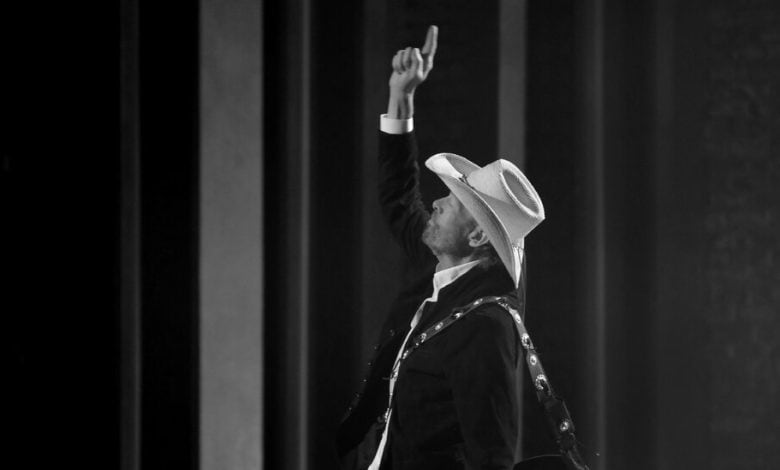Toby Keith’s Pre-Partisan Patriotism

Toby Keith already had a string of country hits before he wrote the 2002 song that cemented his place in the then-burgeoning culture wars: “Courtesy of the Red, White and Blue (The Angry American).” He later said the song was written in 20 minutes as an emotional response to both his father’s death and the Sept. 11th attacks. When Keith played it for the first time in a solo performance (his band hadn’t yet learned the chord changes) at the Naval Academy in Annapolis, Md., the response was rapturous. As the Rolling Stone writer Mark Binelli wrote, “The room went silent, then, when he hit the chorus, broke into a roar.” As a post-9/11, pro-America anthem — whether you like the song or not — it’s hard not to see why: “The eagle will fly man, it’s gonna be hell / When you hear mother freedom start ringin’ her bell / And it’ll feel like the whole wide world is raining down on you / Brought to you courtesy of the red, white and blue.”
Keith, who sold over 40 million albums worldwide and died this week at 62, always claimed he initially didn’t plan to make a studio recording of “Courtesy” — “it wasn’t written for everybody,” he said. (When he did release the song, it went to No. 1 on the Billboard Hot Country Songs chart.) The song was a personal statement crafted specifically for an audience of American soldiers. In this way, it was more of a folk song than a stadium rocker — a rousing prompt to get something done.
To casual listeners, “Courtesy” heralded Keith’s coming out as a conservative, pro-war, red-state warrior, and he did little to dissuade that impression. But like country music — and like the rural America Keith hailed from — he was more complicated than that. When people encounter country music, they’re often quick to try to categorize, no matter where they sit in the political divide: Are these anthems meant for us or meant for them? The truth is almost always more nuanced. What we miss when we don’t acknowledge this is the same thing we miss when we divide the nation into intractable red and blue states.
“Courtesy of the Red, White and Blue” recalled another of country music’s biggest in-your-face-conservative political hits: Merle Haggard’s 1969 hit “Okie From Muskogee,” which took aim at student-led antiwar protests and was written in the voice of a fed-up rural American. (“We don’t smoke marijuana in Muskogee / We don’t take our trips on LSD.”) In some ways Keith modeled himself on Haggard. Both former oil field hands, they shared true working-class bona fides and expressive baritones but practiced a personal brand of politics that could seem confusing. Keith had broken into the country music scene with his first single, “Should’ve Been a Cowboy,” a light-as-a-breeze nostalgic number that went on to become the most played song on country radio in the 1990s. Haggard was early in his career more of a sad-sack singer, performing songs about jail stints, hard drinking and heartache.
Over the years Haggard gave conflicting accounts as to whether “Okie” was intended sincerely or meant as a sly satire. Personally I like to think it was a bit of a joke, but then my politics are more progressive in general. As a guy who has debated this topic over flat beer in honky-tonks across America, I’ve honestly found that opinions tend to fall neatly along party lines.
Keith’s political affiliations could be just as confounding. He was a Democrat until 2008, when he switched his registration to independent, and, in 2009, he traveled to Oslo to perform at a celebration of President Barack Obama’s being awarded the Nobel Peace Prize. In 2017, he headlined President Donald Trump’s inauguration — where he took a moment to thank Mr. Obama from the stage. His politics certainly seemed contradictory but his stubborn willingness to treat every American president with respect revealed a consistent moral code. He was a throwback to a time when a man could play a guitar with an American flag on it, wearing an American flag on his shirt, in front of the American flag, and nobody would assume he voted one way or the other.
We are having trouble retrieving the article content.
Please enable JavaScript in your browser settings.
Thank you for your patience while we verify access. If you are in Reader mode please exit and log into your Times account, or subscribe for all of The Times.
Thank you for your patience while we verify access.
Already a subscriber? Log in.
Want all of The Times? Subscribe.